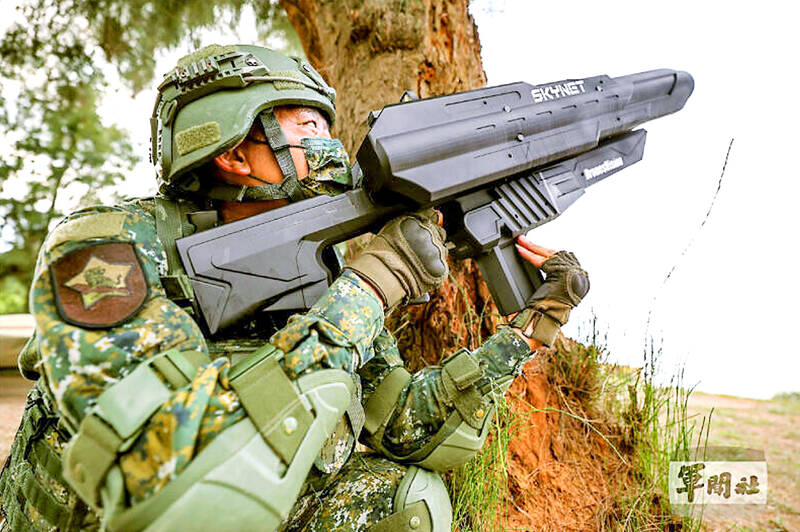The Executive Yuan yesterday approved a draft act authorizing military personnel to use their weapons to defend a base against trespassers and imposing prison sentences for spying on restricted military sites with drones.
Defense officials proposed the law to bolster the security of military bases and sites after legal reviews found current regulations to be insufficient, the Ministry of National Defense told a news briefing.
Intrusion by drones into restricted space, trespassing by civilians into bases and assault on guards have occurred in the past, it said.

Photo courtesy of the Military News Agency
The proposed legislation suggests authorizing guards to use weapons and other implements to prevent unauthorized entry into military bases and intrusion into restricted airspace by uncrewed aerial vehicles, the ministry said.
Committing theft in crucial military facilities, causing damage to these facilities or endangering their security would result in a sentence of one to seven years in prison and a fine of up to NT$10 million (US$311,410), it said.
Carrying out these acts with an intent to impede or interfere with national security would result in a sentence of three to 10 years in prison and a fine of no more than NT$50 million, the ministry said.
If death occurs as a result of such acts, the penalty would be further increased to seven years to life in prison and a fine of up to NT$100 million, it said.
A penalty of five to 12 years in prison and a fine of up to NT$80 million is stipulated in cases where such acts led to serious injuries, the ministry said.
Jeopardizing the normal operation of core informational systems of military bases would lead to a sentence of one to seven years in prison in addition to a NT$10 million fine, it said.
Unauthorized surveying, recording or description of military facilities with the aid of drones is punishable by a sentence of up to three years in prison, the ministry said.
Compromising a military base’s security by surveying, recording or describing it from outside the restricted area would be punishable by a fine of NT$300,000 to NT$500,000.
The proposed law would apply to crucial military facilities, bases of military units and organizations, or any legally formed restricted area in which military exercises or training is being conducted, it said.
Attempts to intimidate or blackmail service members guarding a military base or other restricted area would be punishable by a sentence of no more than three years in prison commutable to a NT$300,000 fine, the ministry said.
Entering into restricted military areas would result in a NT$40,000 to NT$200,000 fine for each count of trespass, it added.
In related news, the Executive Yuan also approved amendments to the Domestic Violence Prevention Act (家庭暴力防治法) and Sports Industry Development Act (運動產業發展條例).
The changes to the law against domestic violence would require social media platforms and Internet service providers to remove or restrict access to sexual recordings of domestic abuse victims upon being notified by authorities.
Platforms and service providers that fail to remove or restrict access to such material after being notified to do so would be subjected to a repeatable fine of NT$60,000 to NT$600,000.
Proposed changes to the sports law would punish scalpers of sports events with a fine of 10 to 50 times the original ticket value, while large-volume scalping could result in a prison sentence of up to three years.
A fine of no more than NT$3 million could be added to the latter type of breach or used to commute the prison sentence.

The disruption of 941 flights in and out of Taiwan due to China’s large-scale military exercises was no accident, but rather the result of a “quasi-blockade” used to simulate creating the air and sea routes needed for an amphibious landing, a military expert said. The disruptions occurred on Tuesday and lasted about 10 hours as China conducted live-fire drills in the Taiwan Strait. The Civil Aviation Administration (CAA) said the exercises affected 857 international flights and 84 domestic flights, affecting more than 100,000 travelers. Su Tzu-yun (蘇紫雲), a research fellow at the government-sponsored Institute for National Defense and Security Research, said the air

Taiwan is to commence mass production of the Tien Kung (天弓, “Sky Bow”) III, IV and V missiles by the second quarter of this year if the legislature approves the government’s NT$1.25 trillion (US$39.78 billion) special defense budget, an official said yesterday. Commenting on condition of anonymity, a defense official with knowledge of the matter said that the advanced systems are expected to provide crucial capabilities against ballistic and cruise missiles for the proposed “T-Dome,” an advanced, multi-layered air defense network. The Tien Kung III is an air defense missile with a maximum interception altitude of 35km. The Tien Kung IV and V

Trips for more than 100,000 international and domestic air travelers could be disrupted as China launches a military exercise around Taiwan today, Taiwan’s Civil Aviation Administration (CAA) said yesterday. The exercise could affect nearly 900 flights scheduled to enter the Taipei Flight Information Region (FIR) during the exercise window, it added. A notice issued by the Chinese Civil Aviation Administration showed there would be seven temporary zones around the Taiwan Strait which would be used for live-fire exercises, lasting from 8am to 6pm today. All aircraft are prohibited from entering during exercise, it says. Taipei FIR has 14 international air routes and

Taiwan lacks effective and cost-efficient armaments to intercept rockets, making the planned “T-Dome” interception system necessary, two experts said on Tuesday. The concerns were raised after China’s military fired two waves of rockets during live-fire drills around Taiwan on Tuesday, part of two-day exercises code-named “Justice Mission 2025.” The first wave involved 17 rockets launched at 9am from Pingtan in China’s Fujian Province, according to Lieutenant General Hsieh Jih-sheng (謝日升) of the Office of the Deputy Chief of the General Staff for Intelligence at the Ministry of National Defense. Those rockets landed 70 nautical miles (129.6km) northeast of Keelung without flying over Taiwan,